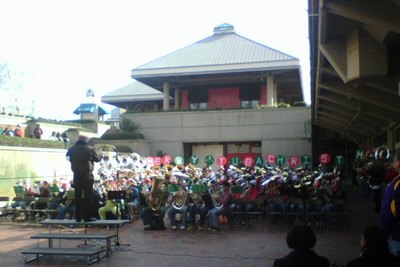Despite a catastrophic year on the stock market, I would like to contribute my 2009 Roth IRA limit of $5,000 in January. Since I don't have cash lying around for that, I'd like to sell some other investments and take as big a loss as possible for 2008 and then use those proceeds for my Roth contribution in January. If possible, I don't want to miss any trading days by having money in a bank account, given that any day could possibly be a big rally that I would miss. But I can't take a loss on something in 2008 and buy something in 2009 without missing a day. Or can I?
One fund that I want to sell is Fidelity Small Cap because it has huge distributions each year (despite losing 40% of its value this year, it still distributed 1% in gains this year) that I then pay taxes on. So I want to sell all of that for $2,100 and realize a $1,500 loss. What I will do is sell it before the end of the year and move it that day into Fidelity Diversified International, a non-Roth fund in which I already have more than $2,100 (important later on). I will have to pay a short-term redemption fee of 2% to Fidelity on Small Cap's December reinvested distribution of $8 (not a big deal) but all of the other shares have been held long enough not to incur such a charge (though a reinvested June distribution of $16 will incur a short-term instead of a long-term loss, not that it matters much since long term losses will cancel short term gains and/or regular income).
Then, in 2009 I can sell some of Diversified International directly into my Roth IRA. Diversified International has a short-term redemption fee as well, but Fidelity says that as long as I have enough older shares in the fund (which I do since I have more than $2,100 there right now), those will be sold first and I won't pay a short-term redemption fee. Even better, because there is a loss there too, I will take a small loss (diluted by the shares bought at the end of December) on that sale for 2009 since I am using the average cost of the shares (I did the calcs today and figured a loss of $129 if prices don't change until then).
For the rest of my $5,000 contribution limit I am going to sell some Nasdaq Powershares (QQQQ) that I have with Scottrade. In order to avoid sitting out of a rally, I am going to get some cash I have with Scottrade in check form right now and then sell the Powershares by the end of the year to replace that money. If I sell those shares on Dec 31, I won't be able to buy anything in the Roth until Jan. 2, but I'll only be missing a day. If I sold the shares and then waited for Scottrade to mail me the proceeds it would take a week or more.
So here's the plan: before the end of the year, move Fidelity Small Cap into Diversified International (taking an '08 loss), move cash in Scottrade to my bank account, and sell my Powershares at Scottrade (taking an '08 loss). Then, on January 2, move $2,100 from Diversified International (taking a small '09 loss) and $2,900 from my bank account into the Roth IRA.
The only question now is would it be to my advantage to sell some other mutual funds just to realize a loss and then reinvest that money in 2009? The IRS will let me offset up to $3,000 in income with capital losses and right now my net realized losses will only be around $300. If I sold about $8,000 of Vanguard 500 Index, I would realize about $3,000 in losses, which would be taken off of my income and earn a $930 tax rebate (25% federal plus 6% state). I see no reason I wouldn't do that. If I reinvest it immediately into another Vanguard fund, I wouldn't be out of the market for any time either and would not be subject to wash rules for selling something at a loss and then buying the same thing back in less than 30 days.
